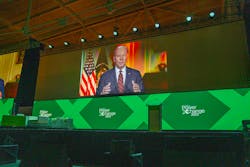NRECA TechAdvantage: Infrastructure Funding to Help Co-ops Lead the Utility Space
Leadership was the word on many presenters’ lips at the 2023 TechAdvantage/PowerXchange conference and exhibition in Nashville, which was hosted by the National Rural Electric Cooperatives Association.
Two of NRECA’s top policy priorities – direct payment of energy tax credits for cooperatives and more federal level funding for infrastructure improvement – made some major headway. President Joe Biden delivered a brief video address to the gathering to underline the U.S. Department of Agriculture’s $2.7 billion in loans for rural electric cooperatives to modernize power grid infrastructure and increase grid security.
“Rural co-ops like yours electrify America. Now we’re making the biggest investment in rural co-ops since the New Deal,” Biden said. “Your communities are the backbone of the country. Investing in them is critical to our entire nation’s prosperity and security. Millions of Americans rely on you every single day. We owe you and we thank you.”
At an opening address for the PowerXchange conference, Matheson said cooperatives are meeting customer needs through resiliency, reliability, cybersecurity, broadband access and safety.
“Today, we’re called to do more for our members than ever before,” Matheson said Monday at the association’s annual meeting, which attracted more than 9,000 electric co-op representatives. “More is expected of us…to serve the entire community with quality and consistency. It’s time to lead.”
Cooperatives are taking the long view and investing in good leadership as well as promising technology, Matheson said.
“We want our accomplishments to outlive us,” said Matheson, adding that cooperatives are unlike other businesses in that they are owned and led by their users. ““No one else does business this way, but we do it without hesitation.”
Outgoing president of the NRECA, Chris Christensen said good leadership is based upon trust.
“You need to trust in each other. You need to take the time to share your successes as well as your challenges with others here at PowerXchange,” Christensen said. “You need to listen intently, and then follow through with action when you get back home.”
Christensen is NRECA’s Montana director and sits on the board of NorVal Electric Cooperative in Glasgow, Montana, where he previously taught high school and worked on a family owned ranch.
“Each of you play a leadership role in your own right at your co-op. That’s why you are here in Nashville,” he said. “Jim Matheson said it earlier, and I agree. We’re stronger when we work together and when we learn from each other as we tackle the many issues that lead to success at our co-ops.”
Celebrating an Infrastructure Win
Several speakers mentioned the federal-level funding for infrastructure improvement that was recently announced. President Joe Biden delivered a brief video address to the convention to underline the Department of Agriculture’s $2.7 billion in loans for rural electric cooperatives to modernize transmission and distribution infrastructure and increase grid security.
“Rural co-ops like yours electrify America. Now we’re making the biggest investment in rural co-ops since the New Deal,” Biden said. “Your communities are the backbone of the country. Investing in them is critical to our entire nation’s prosperity and security. Millions of Americans rely on you every single day. We owe you and we thank you.”
The latest round of Electric Loan Program funds will go toward 64 projects benefiting nearly 2 million people in 26 states.
The loans include $613 million for installing and updating smart grid technologies, and nearly half of the awards will help finance improvements in underserved communities.
According to an NRECA release, one of the largest awards will go to Withlacoochee River Electric Cooperative, which serves a high-poverty but fast-growing five-county area near Tampa, Florida. The Dade City-based co-op will use its $212 million loan to build and improve 580 miles of transmission line.
About $32 million will be used for substation and transmission projects, and another $17 million will strengthen smart grid technologies, the co-op said. The largest portion, $58 million, will go toward new underground electric infrastructure to serve new residential subdivisions.
Other coop loans include:
- Clark Energy Co-op, Winchester, Kentucky: $26 million to build and improve more than 250 miles of power line in 12 central Kentucky counties. The loan also includes about $500,000 for smart grid technologies.
- Marshall County REMC, Plymouth, Indiana: $10 million to build and improve 75 miles of line in six counties in northern Indiana and nearly $1 million for smart grid technologies.
- Rusk County Electric Cooperative, Henderson, Texas: $24.6 million to connect an estimated 2,000 new members and build and improve 91 miles of line in five counties spanning 4,000 square miles. Projects include voltage conversion upgrades, a new transmission feed and substation construction. The loan also includes about $1.4 million for smart grid technologies.
About the Author
Jeff Postelwait
Managing Editor
Jeff Postelwait is a writer and editor with a background in newspapers and online editing who has been writing about the electric utility industry since 2008. Jeff is senior editor for T&D World magazine and sits on the advisory board of the T&D World Conference and Exhibition. Utility Products, Power Engineering, Powergrid International and Electric Light & Power are some of the other publications in which Jeff's work has been featured. Jeff received his degree in journalism news editing from Oklahoma State University and currently operates out of Oregon.
